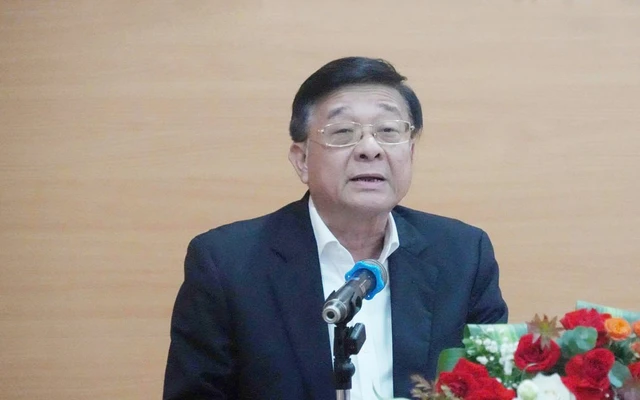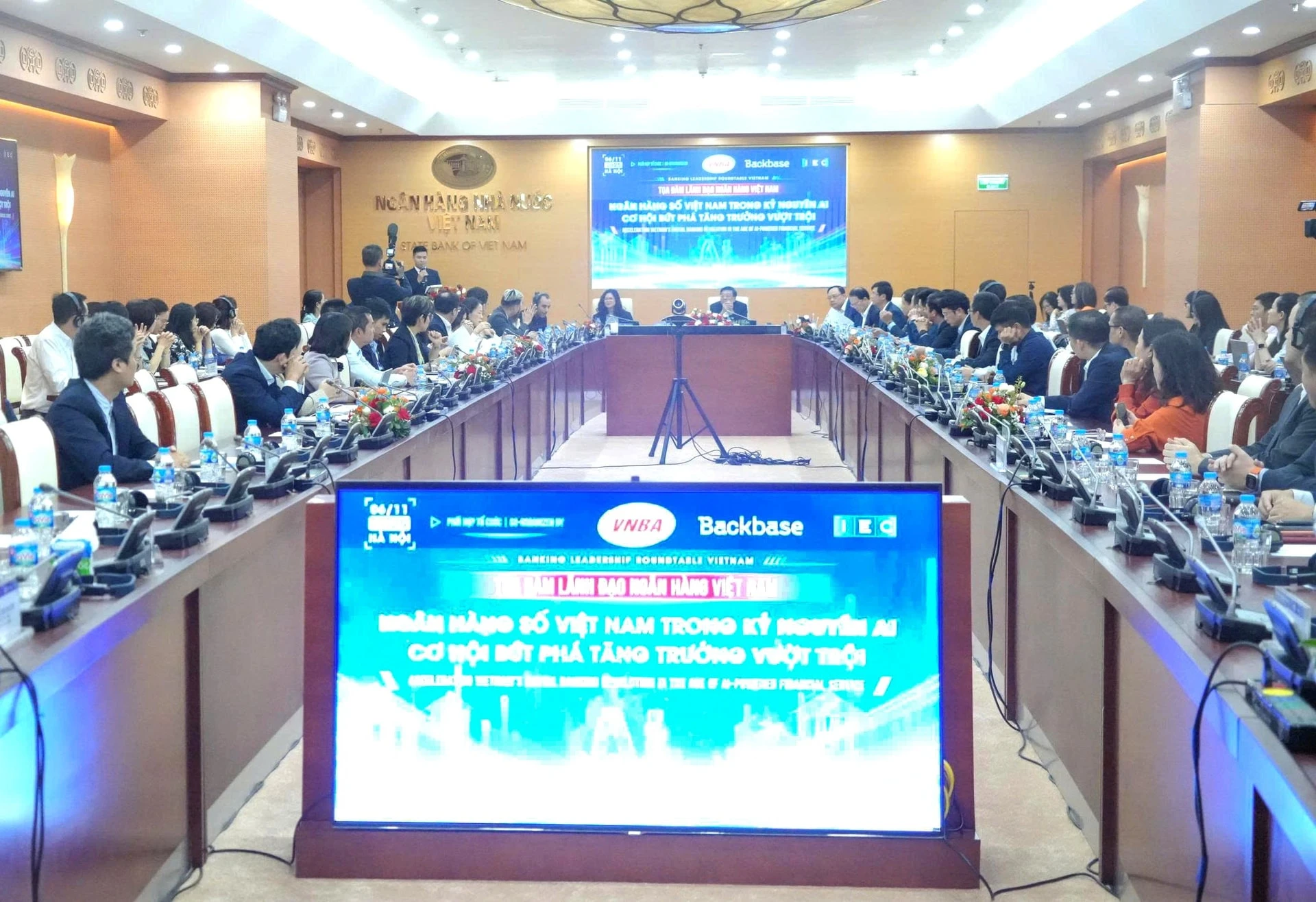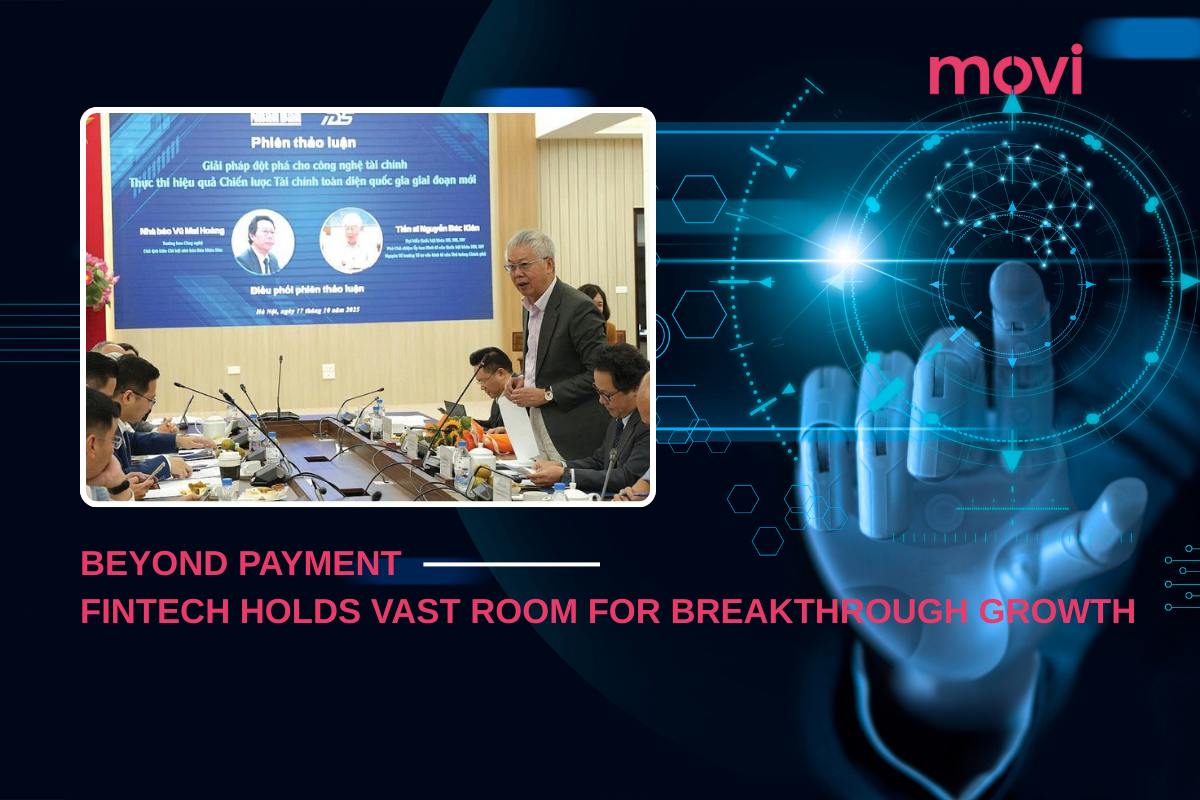
Loading
VIETNAM'S DIGITAL BANKS IN THE AGE OF AI: UNLOCKING A NEW FRONTIER FOR EXPONENTIAL GROWTH
Hanoi, November 6 - Under the auspices of the State Bank of Vietnam (SBV), the Vietnam Banks Association (VNBA), in collaboration with IEC Group and Backbase, jointly hosted the Vietnam Banking Leaders Roundtable themed “Vietnam’s Digital Banks in the Age of AI, Unlocking a New Frontier for Exponential Growth.”
The roundtable was attended by Mr. Pham Anh Tuan, Director General of the Payment Department, SBV; Mr. Nguyen Quoc Hung, Vice Chairman and Secretary General of the Vietnam Banks Association; together with representatives from SBV functional departments, senior executives from credit institutions, fintech companies, technology enterprises, and experts in the field of information technology.
“The Key” to an Intelligent Operating Journey for Vietnam’s Banking Industry
In his opening remarks, Mr. Nguyen Quoc Hung, Vice Chairman and Secretary General of the Vietnam Banks Association, highlighted that throughout its digital transformation, the banking sector has experienced a remarkable journey – from digitizing transaction channels to modernizing core systems, and then opening connectivity to broader ecosystems.
Now, he noted, the industry is entering a new era: banks powered by artificial intelligence.

Mr. Nguyen Quoc Hung, Vice Chairman and Secretary General of the Vietnam Banks Association, delivered the opening remarks at the roundtable.
Mr. Hung identified four key values AI can deliver to Vietnamese banks: quality growth, lean operations, proactive risk management, and trust & compliance.
He emphasized that AI not only enables faster and more cost-efficient operations but also allows banks to gain deeper customer insights, improve predictive accuracy, and engage with customers in real time at scale.
Citing a Deloitte report, Dr. Nguyen Quoc Hung shared that leading global banks investing in AI could improve business performance by 27–35%, with revenue per employee expected to increase by up to USD 3.5 million by 2026.
In Vietnam, numerous banks have already pioneered AI applications such as chatbots, e-KYC, predictive analytics for customer behavior, and fraud detection, significantly enhancing both service quality and customer satisfaction.
From these figures, Mr. Hung noted that while AI offers enormous benefits for banks, turning potential into tangible results requires overcoming multiple challenges from data exploitation and implementation to data governance, balancing human and automation, building digital skillsets, and organizational capacity.
He also underscored the importance of collaboration among banks, regulators, fintechs, and technology partners to ensure rapid yet safe, compliant, and sustainable innovation.
AI - A Core Capability Reshaping Banking Operations
Sharing the same perspective, Mr. Pham Anh Tuan, Director General of the Payment Department, SBV, emphasized that AI is not merely a technological tool but a new strategic capability redefining how banks operate, make decisions, and serve customers.
He outlined three layers of AI capabilities in banking:
- Predictive AI - forecasting probabilities, classifying behaviors, and identifying risks.
- Generative AI - interpreting and recreating information.
- Agentic AI, not only making recommendations but also executing actions.
Mr. Tuan affirmed that AI is no longer an experimental technology; it is evolving into a core competency within the operational and growth strategies of many banks.
For Vietnam’s banking industry, he highlighted three major opportunities AI presents:
- Understanding customers better than ever before.
- Operating more efficiently.
- Making smarter, data-driven decisions.
He further noted that Vietnam has already established a strong legal framework for safe and transparent AI deployment in finance and banking - including Decree 13/2023/ND-CP on personal data protection, Decree 52/2024/ND-CP on cashless payments, along with multiple documents on digital transformation and cybersecurity.
According to Mr. Tuan, while AI cannot replace human emotion, experience, or ethics, it can amplify human intelligence and productivity when understood, applied, and governed properly.
He stressed that the goal is to understand to apply correctly, apply to create value, and apply to sustain trust - paving the way for a modern, intelligent, safe, and human-centric financial ecosystem, where AI serves as a human assistant, not a human replacement.
From Backbase’s Perspective - Personalized, Data-Driven Banking
From the viewpoint of a leading AI-banking solutions provider, Ms. Tran Thi Diem Chi, Country Representative of Backbase Vietnam, shared that AI enables real-time hyper-personalization and automated customer interaction across digital channels.
The technology also optimizes and enhances operational efficiency by harmonizing the purely digital experience with human advisory support from customer service professionals.
She emphasized that banks are striving to scale AI safely and compliantly, ensuring that implementations generate genuine organizational value.
Currently, many Vietnamese banks are pioneering AI adoption, demonstrating a strong spirit of innovation and determination to leverage AI not merely for digitization but to understand, predict, and accompany their customers.
Effective AI Implementation in Banking
At the roundtable, regulators, bank leaders, and top experts analyzed how AI is reshaping Vietnam’s digital banking landscape, creating strategic opportunities for breakthrough growth, operational efficiency, and enhanced customer experience.

General view of the roundtable
According to Mr. Chris Shayan, Head of AI at Backbase, with rapid advances, Vietnamese banks are now approaching global leaders in AI adoption.
While each bank may take a different path – some aggressively applying AI, others more cautiously – they share a common approach: acting genuinely, measuring real outcomes, and reusing insights for subsequent development phases.
Mr. Shayan stressed that technology development must always be outcome-driven. Banks should focus on high-value, high-feasibility use cases rather than deploying AI indiscriminately.
For Backbase, he highlighted three core technical capabilities:
- AI Recommendation Engine – A system that suggests products best suited for each customer based on behavioral data.
- For instance, a customer logging in today may be offered a credit card; tomorrow, a car loan or an investment product.
- Previously done manually, such tasks are now automated – faster and more accurate.
AI-Empowered Staff Assistance – AI summarizes customer data and suggests next actions, enabling service agents to respond more effectively.
AI supports, rather than replaces, human decisions, making them faster, more accurate, and more personalized.
Growth Through Experience and Loyalty – Backbase invests in Digital Twin models – digital replicas of customers – to analyze financial behavior and recommend tailored solutions.
This helps banks not only retain customers but accompany them throughout their financial journeys.
AI Transformation - A Gradual, Human-Centered Process
Mr. Phan Thanh Duc, Senior Lecturer and Head of the Faculty of Information Technology and Digital Economy at the Banking Academy of Vietnam, cautioned that AI transformation cannot be rolled out simultaneously across all customer bases.
He advised banks to select small target groups, conduct pilots, and scale gradually to ensure synchronization and stability.
From practical implementation, representatives of MSB, SHB, VietinBank, Techcombank, and MB shared their best practices in effective AI application.
They recommended a three-phase roadmap for AI implementation:
- Prepare a strong technical and data foundation.
- Identify priority use cases.
- Execute in a controlled, monitored manner.
At the same time, banks must prioritize human-capital development for digital transformation – building digitally-skilled leadership teams, investing in digital talent development, and creating motivating work environments to attract and retain top professionals.
Regulatory Perspective and AI Governance
From the regulator’s perspective, Mr. Pham Anh Tuan underlined that the key issue for financial institutions is determining how to apply AI safely and effectively, while establishing risk-based AI governance frameworks.
The State Bank of Vietnam is currently reviewing a proposal to develop governance standards that align with the risk levels of AI models. Once models meet required criteria, the SBV will consider authorizing broader implementation.
Additionally, the SBV has established an AI Model Review Council to oversee and assess the reliability and safety of AI deployments – whether developed internally by banks or sourced from third parties.
Regional Benchmarks and the Path Forward
During the roundtable, experts also presented advanced digital-banking models from across the region, offering a comprehensive perspective and helping to identify key focus areas that must be addressed to accelerate a successful and sustainable digital transformation in Vietnam’s banking industry.
Sources: nhipsongkinhdoanh.vn & cafef.vn














